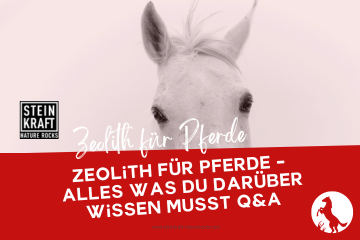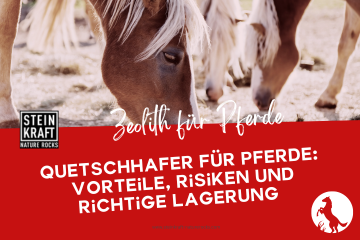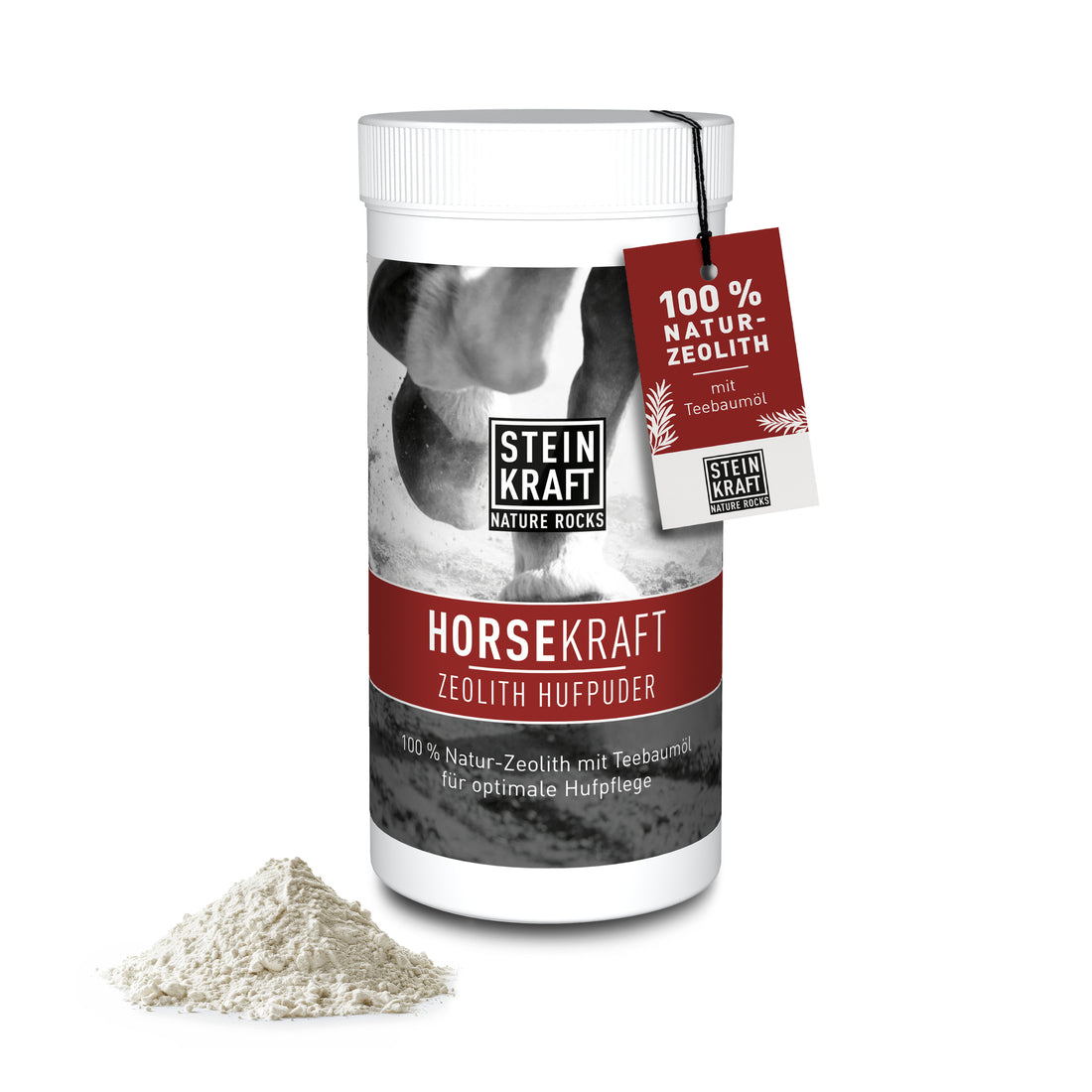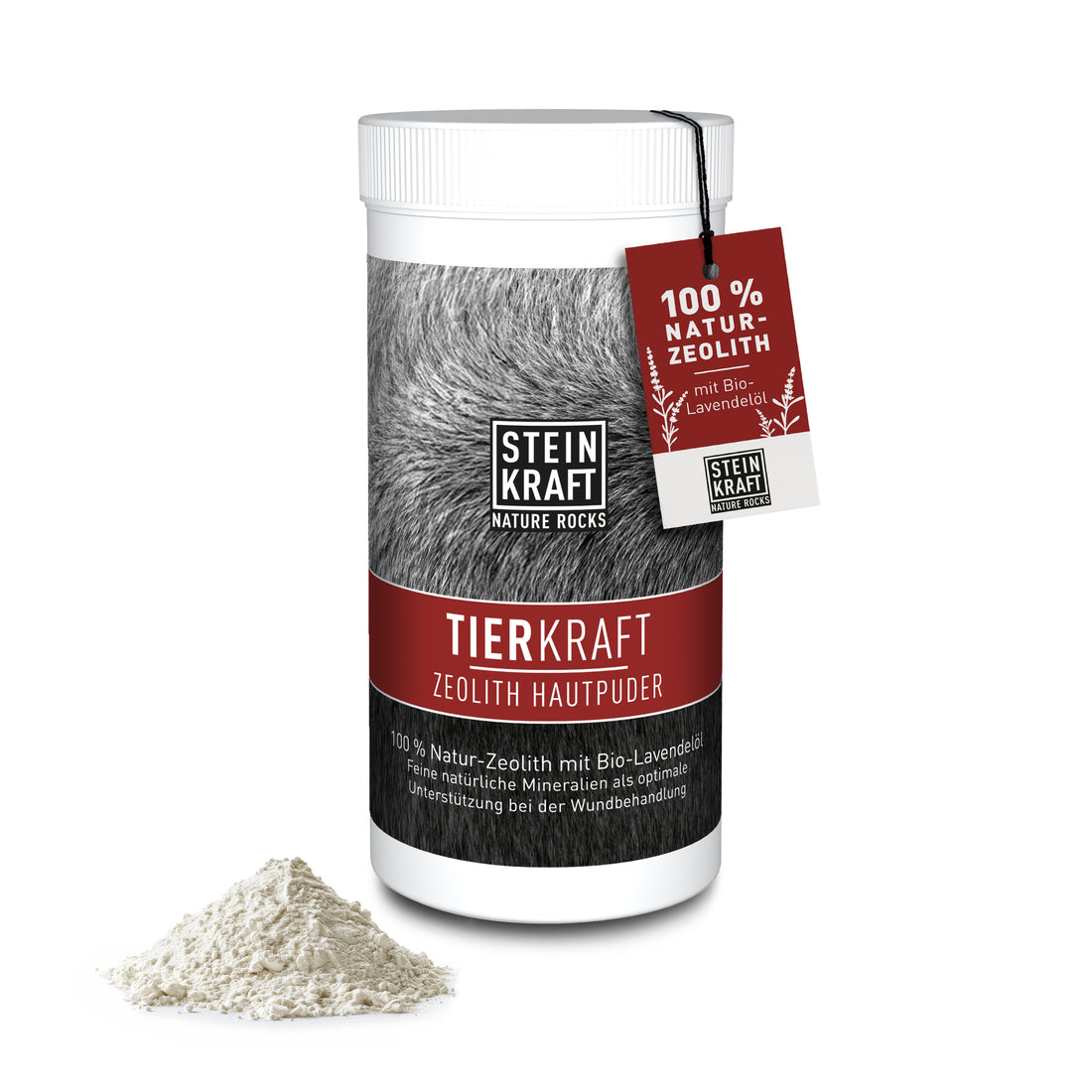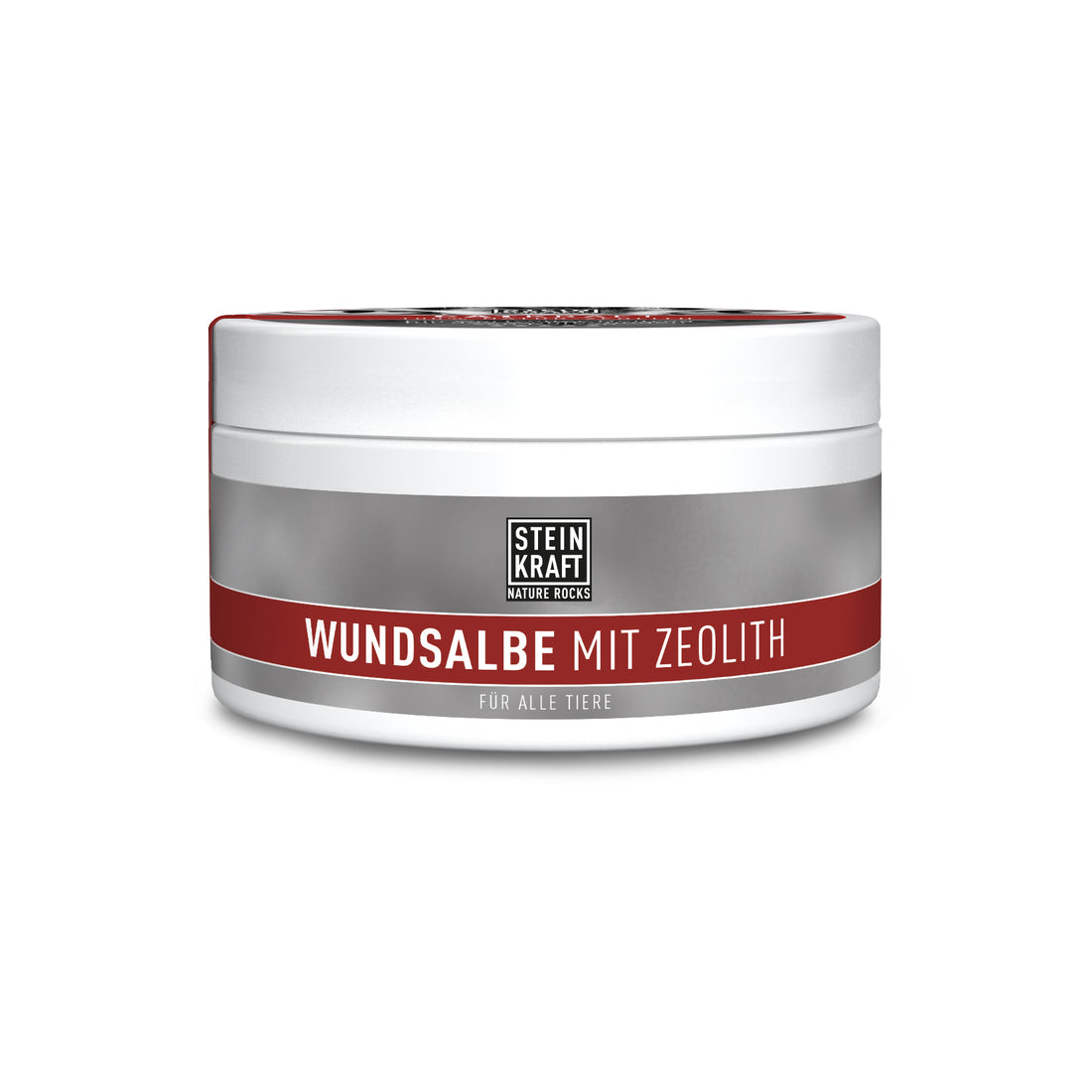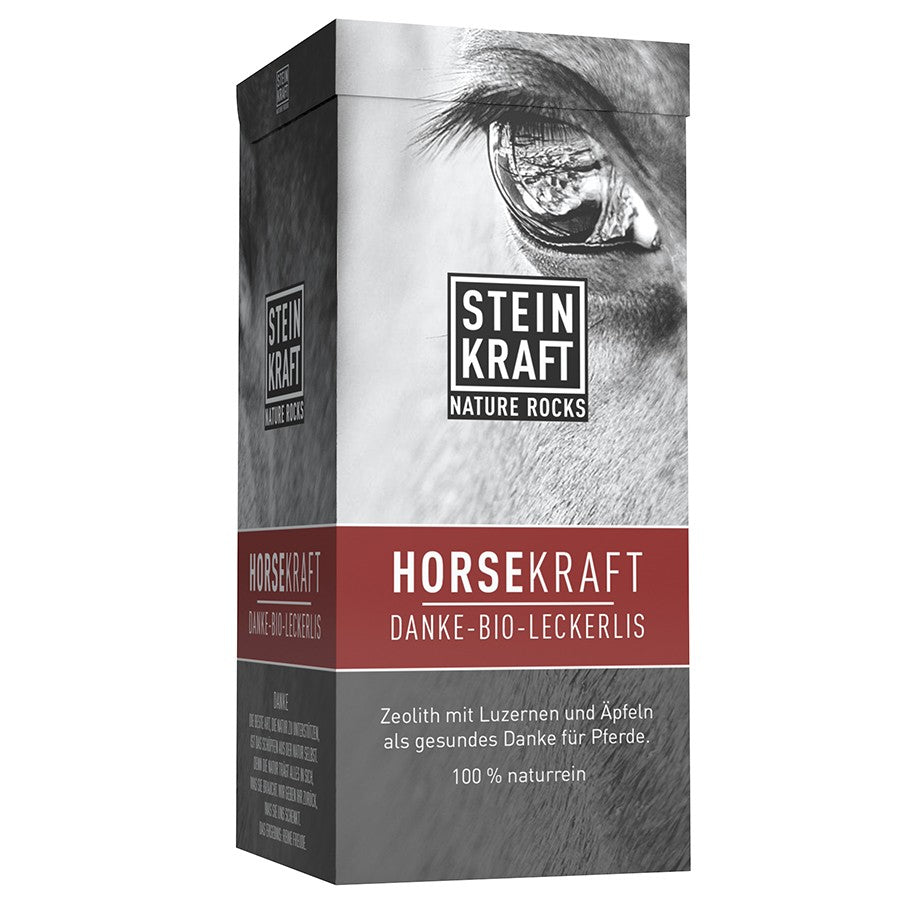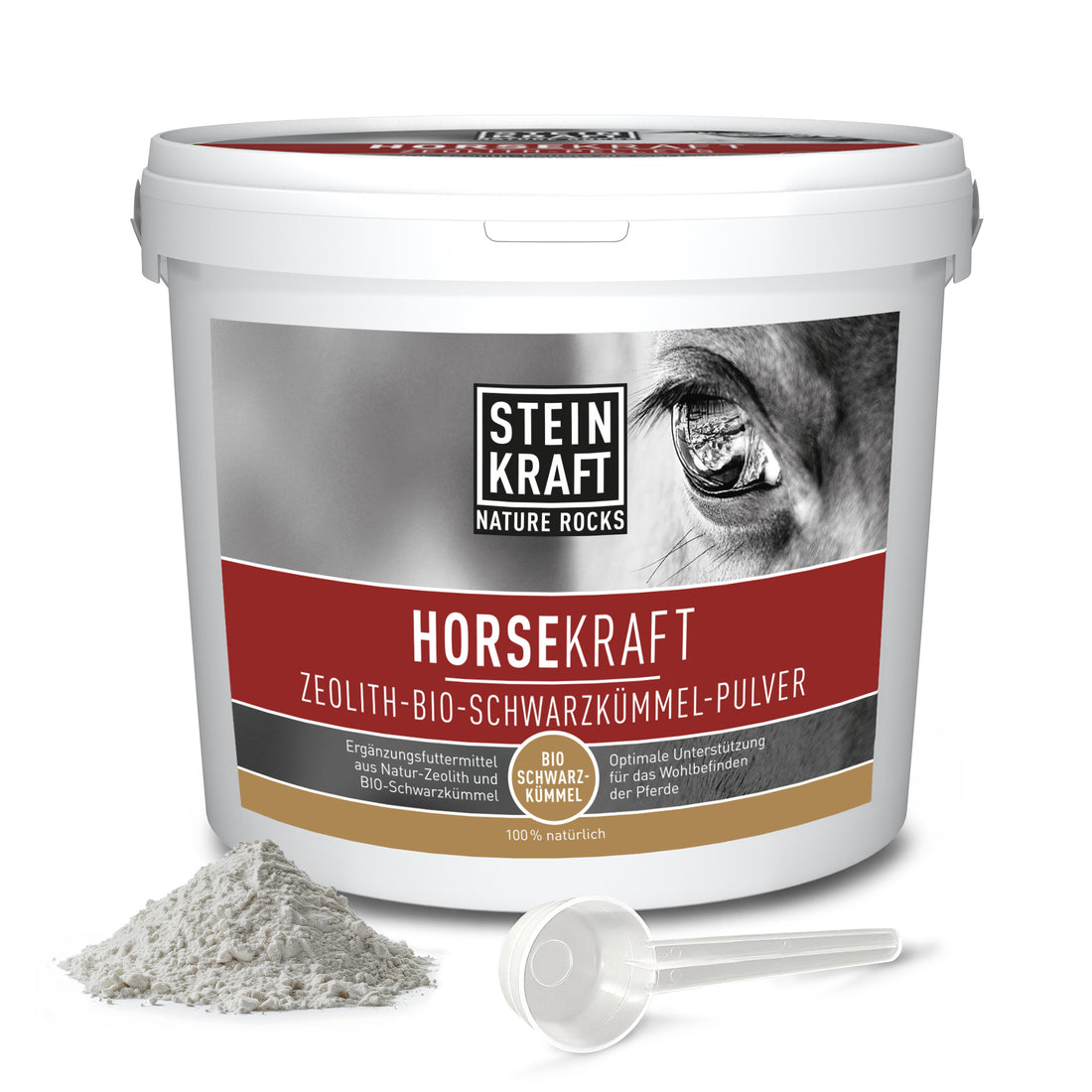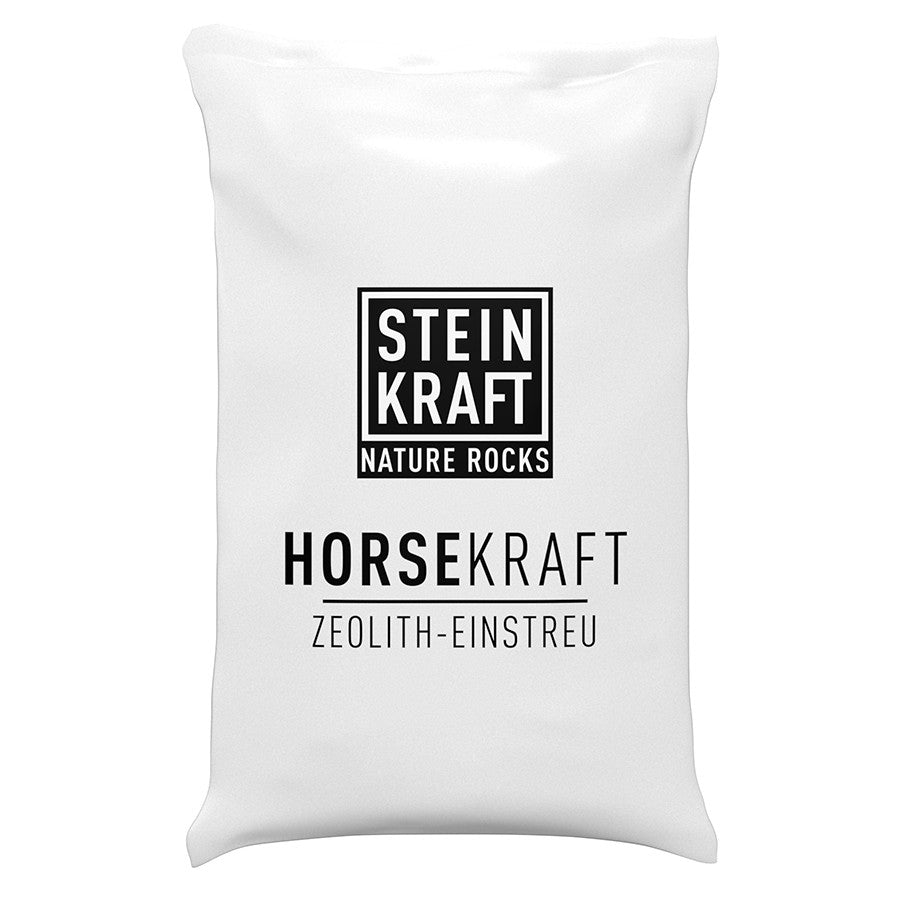Diarrhea in horses – A silent cry for help from the intestines
What really helps: Naturopathy, zeolite and a mindful look behind the symptom
When the intestine speaks, the person can listen
Diarrhea in horses is not an isolated case. More and more horses—whether young or old, leisure partners or sport companions—are exhibiting this irritating symptom: wet hind legs, brown fluid on the tail, and a worrying odor. But although diarrhea is widespread, it often remains misunderstood. Many react with rapid measures, feed additives, or medication—without knowing the true cause.
This article invites you to pause and look deeper: into the horse's digestive tract, into the language of its body, into the causes behind the symptoms. And it shows how gentle natural healing – especially zeolite – can help in a holistic way. Because the intestine is more than an organ. It is a place of balance, calm, inner stability – and a reflection of the horse's living conditions.
What is watery stool? And how does it differ from diarrhea?
Watery stools are characterized by the secretion of brown, thin liquid, which is passed separately from the horse's normal manure. The fecal balls themselves usually remain formed. In contrast, diarrhea is a complete softening or liquefaction of the entire feces. This is a crucial difference – because while diarrhea is often an acute reaction to infection or poisoning, watery stools signal something else: a chronic imbalance.
Diarrhea isn't an emergency—but it is an important warning sign. And an invitation to identify causes instead of simply masking symptoms.
Causes: When balance is lost
Diarrhea rarely results from a single cause. It's the result of a combination of diet, posture, stress, and internal imbalance .
The most important factors at a glance:
1. Feeding errors
-
Poor or overripe hay (too woody, too much lignin) can no longer bind water sufficiently.
- Moldy or musty batches lead to toxin load in the intestines.
- Silage or haylage overwhelms the colon flora if the horse is not gradually accustomed to it.
- Sudden changes in feed disrupt intestinal bacteria – for example, when changing from grass to hay in autumn.
- Feeds rich in sugar , too much concentrated feed or protein-rich grass promote fermentation.
2. Attitude and management
Irregular feeding or long breaks between meals irritate the stomach and intestines.
Lack of movement , especially in winter, slows down peristalsis.
Sand ingestion on poor soil mechanically irritates the intestinal mucosa.
Dental problems lead to food not being chewed and digested properly.
3. Psychological stress – underestimated, but often central
Many horses react to social stress (e.g., herd unrest, dominance fights), transport, stable confinement, or sudden changes in weather with diarrhea. The autonomic nervous system directly influences digestion via the gut-brain axis .
What happens in the horse's body
The large intestine is responsible for extracting water from the food pulp. But when the microbial balance is disturbed—for example, by too much starch, sugar, or poor fiber quality—the flora becomes disturbed. Fermentation processes, acids, and toxins develop. These irritate the intestinal mucosa, prevent water absorption, and thus it flows out unbound.
Dysbiosis (disturbed intestinal flora)
Overacidification caused by lactic acid bacteria
Inflammation of the mucous membrane
Irritable bowel syndrome due to chronic tension
Often the horses appear healthy on the outside – but exhausted on the inside.

What horse owners feel
Diarrhea isn't just unpleasant—it's deeply moving. Many report feelings of uncertainty, worry, and compassion . The images are similar:
“I look into my horse’s eyes and see: It’s not sick, but it’s not really healthy either.”
“Wash the hind legs daily, apply wound ointment – but nothing really helps.”
"I've tried so many things, but I feel that the gut needs more than just medicine."
The uncertainty is great – and yet with it comes the growing desire to listen more closely and explore new paths.

Customer examples: Three paths, three experiences
Case 1: Luna, 12 years old, low-ranking in the herd
Luna's owner noticed that the diarrhea always occurred after herd changes or during the winter. A combination of zeolite , hay analysis, dental treatment, and a herbal mixture brought noticeable relief. The diarrhea stopped—not immediately, but permanently.
Case 2: Ole, 6 years old, gelding with high grain intake
Ole constantly exhibited moist stools. Only by reducing his concentrated feed, taking a bowel treatment with psyllium and zeolite , and giving him daily exercise did his bowel settle down. "I didn't know how much sugar and starch could put a strain on the intestines," his owner says today.
Case 3: Samira, 18 years old, mild Cushing's syndrome
Samira suffered from recurring diarrhea, especially in winter. Her owner used zeolite pellets for targeted metabolic support. In addition, her emotional environment was changed: Samira received more peace and quiet in the herd – the diarrhea disappeared very quickly.
Gentle solutions with depth – naturopathic support
Naturopathic medicine focuses not on suppression, but on strengthening—on the wisdom of the body, supported by the power of nature.
Zeolite – the heart of many diarrhea treatments
Zeolite has proven effective in naturopathic horse care. It binds:
toxins
Acids
Heavy metals
free radicals
In the intestine, zeolite acts as a buffer. It protects the mucous membrane, supports regeneration, and harmonizes the bacterial balance. Zeolite can contribute to gentle stabilization, especially in cases of dysbiosis, stress-induced diarrhea, or haylage feeding .
"My gelding had diarrhea for months – despite a change in diet, dental check-ups, and stress reduction. Only the administration of zeolite brought calm to his stomach. Since then, his tail has been dry again."
Psyllium husks – the inner brush
Psyllium husks swell in the intestines, bind water, and expel sand accumulations . Combined with zeolite, the intestines are cleansed from within—an ideal combination for diarrhea caused by suspected sand ingestion or poor stool binding.
Healing clay – mineral power for irritated mucous membranes
Healing clay binds toxins, has anti-inflammatory properties, and supports intestinal mucosal regeneration . It can be administered in mash or directly via the feed. Caution: Use only high-quality healing clay.
Herbs, homeopathy and acupuncture
Tannin plants such as oak bark and tormentil have a sealing effect.
Chamomile, fennel, and yarrow soothe irritated intestines.
Homeopathic remedies such as Dulcamara (for cold, wet weather) or Arsenicum album (for food stress) can help to harmonize the inner dynamics.
Acupuncture has a balancing effect on energy flows – especially in cases of stress-related diarrhea.

Simple, effective steps out of imbalance
A naturopathic approach can look like this:
Analyze feeding: hay quality, feeding breaks, amount of concentrate.
Start intestinal cleansing: e.g. with zeolite, psyllium, probiotics and prebiotics.
Reduce stress: grazing time, herd rest, safe rituals.
Use herbs and medicinal plants for support.
Check teeth, movement, sand intake.
All of this with mindfulness. Not all at once—but with love, patience, and the desire to help holistically.

Understanding diarrhea means allowing healing
Diarrhea is more than just a wet hind leg. It's a sign that the horse isn't quite right—that feeding, posture, emotions, and digestion aren't in sync.
Those who have the courage to take a holistic approach will find ways that work deeper than any symptomatic treatment. Zeolite , psyllium, healing clay, herbs, mindfulness—they all speak the same language as the horse: quiet, honest, natural.
A healthy intestine is the basis for a healthy horse.
And a horse whose intestines are calm is an animal that lives in balance.
Studies show that zeolite (clinoptilolite) is effective in treating horses with diarrhea .
The effects can be proven in four areas - we have compiled the studies in a separate article, so if you want to take a deep dive into the efficacy studies of zeolite in animals - here you go >>
Here is the compact summary:
-
Toxin binding: Zeolite adsorbs harmful substances such as mycotoxins, bacterial toxins and excess acids in the intestine and removes them from the body This relieves the organism and eliminates potential causes of diarrhea. Studies on various animal species (poultry, ruminants, pigs) demonstrate the adsorption of aflatoxin. , heavy metals and ammonium by zeolite.
Source: VALPOTIĆ et al: Clinoptilolite nanoporous feed additive for animals of veterinary importance: potentials and limitations -
Soothing the intestinal mucosa: By binding irritating substances and presumably exerting direct anti-inflammatory effects, zeolite protects the intestinal wall. Experimental findings (e.g., reduced NO synthase, increased villi) show a reduction in inflammatory stress and a promotion of intestinal mucosal regeneration. Horses with diarrhea benefit from reduced irritation, allowing the intestines to function normally again.
-
Improved stool consistency: Several independent studies on young animals (calves, piglets, lambs) document a significant reduction in diarrhea with zeolite administration. Stool becomes more malleable and less liquid. If these results are applied to horses, zeolite can help normalize the separate excretion of feces and water (watery stools). Practical observations confirm that watery stools often disappear within a few weeks when zeolite is used as part of the feeding regimen. .
Source: Cerbu et al: The Use of Activated Micronized Zeolite Clinoptilolite as a Possible Alternative to Antibiotics and Chestnut Extract for the Control of Undifferentiated Calf Diarrhea -
Stabilization of the intestinal flora: Zeolite creates an intestinal environment in which beneficial bacteria predominate . The reduction of pathogenic bacteria ( E. coli , Clostridia) and the increase of Lactobacilli under zeolite has been demonstrated in controlled trials. A stable, balanced microbiome prevents fermentation and excessive gas/liquid production in the large intestine. This combats diarrhea at its root. This also speaks in favor of preventative measures, such as adding it to the daily diet or in preparation for feed changes.
Specific studies on the effectiveness of zeolite in treating diarrhea in horses are still limited. The findings largely come from other animals (lambs, calves, pigs, and even chickens) in general veterinary studies. However, they provide strong evidence that zeolite can also be effective in horses in binding toxins, protecting the intestinal mucosa, improving stool consistency, and stabilizing the intestinal flora .
Many veterinarians and alternative practitioners are already successfully using zeolite in diarrhea therapy and are reporting their successes to us --> check out their experiences.
❓ Frequently asked questions (FAQ) about diarrhea in horses and zeolite
What is the difference between watery stools and diarrhea in horses?
With watery stools, the stool remains solid, but a thin brown liquid also runs through. With diarrhea, the stool is mushy or runny.
What are the most common causes of diarrhea in horses?
Diarrhea is usually caused by feeding errors, stress, poor hay quality, feed changes, or an imbalanced intestinal flora. Dental problems or lack of exercise can also be triggers.
Can zeolite help with diarrhea?
Yes, zeolite can bind excess acids and toxins in the intestines, stabilize the intestinal environment, and soothe the mucous membranes. It is often used to help with diarrhea.
How long does it take for zeolite to work on horses?
Initial improvements may be visible after a few days. For chronic diarrhea, zeolite should be given over several weeks, ideally as a course of treatment.
How is zeolite dosed for horses?
Depending on the product, the dosage is usually approximately 5–10 g per 100 kg of body weight per day. When using powder, it is important to provide sufficient water.
Can zeolite be combined with psyllium or healing clay?
Yes, zeolite combines well with psyllium or healing clay. I wouldn't add healing clay to zeolite, because a high-quality zeolite powder can do everything healing clay can do, and much more.
Is zeolite also useful for stress-related diarrhea?
Yes, zeolite can also help with stress-related diarrhea by supporting the intestinal flora and binding irritants in the colon. A combination with herbs or homeopathy is useful.
Can zeolite be fed permanently?
Zeolite can be given as a course of treatment or, if necessary, over a longer period of time. For long-term use, consultation with a veterinarian or animal health practitioner is recommended.
Here you can read many of our customers' experiences >>















